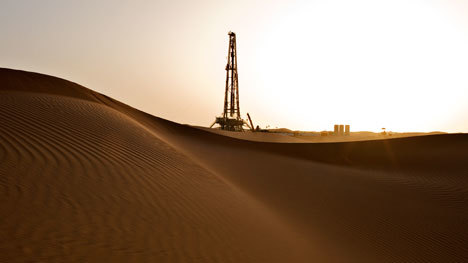
Algerian protesters have rejected the interim leader named to replace former president Abdelaziz Bouteflika, shouting “out with the system” as they called for the dismantling of the political hierarchy that has led Algeria for two decades.
The North African country’s influential military stayed silent on the appointment, saying only that it would work to ensure the “tranquility” of the country.
A student protest had been timed to coincide with the Algerian parliament’s decision to designate the upper chamber’s leader, Bouteflika ally Abdelkader Bensalah, as interim president.
Within an hour of the announcement, police moved in on the demonstrators, dousing them with pepper spray, shooting bursts from a water cannon and using batons to break up the crowd of thousands on a central avenue.
The tensions, which continued into the afternoon, were unusual for the Algerian pro-democracy movement.
Weeks of overwhelmingly peaceful protests forced Mr Bouteflika to step down last week after 20 years in office.
That is giving new hope to millions of young Algerians frustrated by corruption, unemployment and repression – even as it has raised concerns about what is next for the energy-rich country, which is a key partner in the international fight against terrorism.
As called for by the Algerian constitution, Mr Bensalah was appointed to an interim post for a maximum of 90 days until a new election can be organised.
He cannot run for president himself when the election is held.
Members of the opposition abstained from Tuesday’s vote.
“I am required by national duty to take on this heavy responsibility of steering a transition that will allow the Algerian people to exercise its sovereignty,” Mr Bensalah said.
The Defence Ministry said in a statement that the army will work to ensure “the Algerian people’s legitimate right to enjoy total tranquility for the present and the future”.
The much-awaited but inconclusive statement suggests the army will wait to see if there are new mass protests on Friday before deciding whether to throw its support behind Mr Bensalah or not.
The statement did not specifically address Mr Bensalah’s appointment.
Algeria’s powerful army chief, General Ahmed Gaid Salah, turned against Mr Bouteflika last week and sided with the protesters, leading to the president’s departure.
However, many protesters have shown frustration with the army too.
With Mr Bouteflika out, protesters are mainly focusing their anger on other key figures, dubbed the “three Bs”: Mr Bensalah, prime minister Noureddine Bedoui and the head of the Constitutional Council Tayeb Belaiz.
“Out with Bensalah, Belaiz and Bedoui!” shouted protesters at Tuesday’s rally in Algiers, which converged at the plaza in front of the main post office, a symbol of the country’s pro-democracy movement.
Mr Bensalah, 77, has cultivated a low-key profile despite holding numerous positions over the past quarter of a century.
With a career as a devoted public servant, he has no political weight, and his powers as transitional leader are reduced.
Mr Bedoui has a starkly different profile.
He was among the early promoters of a fifth mandate for the ailing Mr Bouteflika – the trigger for the crisis.
Mohamed Saidj, a political science professor, said that as interior minister, Mr Bedoui was also behind forbidding doctors and human rights organisations from protesting.
As for Mr Belaiz, “everyone knows that he is Bouteflika’s man”, Mr Saidj said in a recent interview.